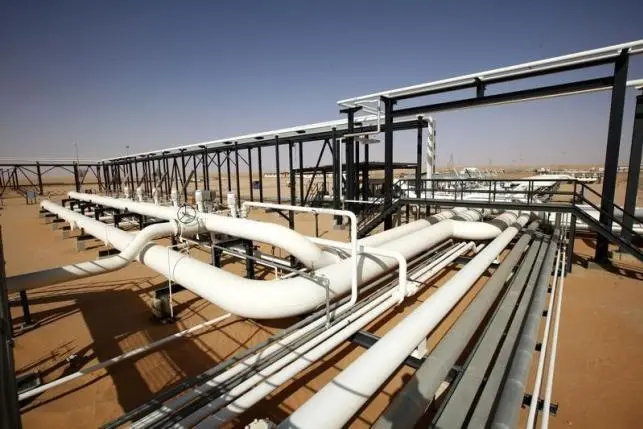PHOTO
BENGHAZI, Libya - Libya's Arabian Gulf Oil Company (AGOCO) is hoping to resolve power problems by the end of March that are keeping production well below potential, its chairman said on Monday.
In recent weeks, AGOCO's production has been fluctuating between around 150,000 and 230,000 barrels per day (bpd), according to an oil source who asked not to be named. On Monday, production stood at 140,000 bpd, well below the more than 320,000 bpd AGOCO was producing in October.
AGOCO, a subsidiary of the National Oil Corporation (NOC), has continued to produce at a high rate from fields in eastern Libya while output from elsewhere in Libya has been hit by years of political turmoil and armed conflict.
But it has suffered from power supply problems and -- like other operators in the North African OPEC member -- funding shortfalls for its operating budget and a lack of investment.
Libya's national output has been hovering around 1 million bpd since June, about four times mid-2016 levels. Along with Nigeria, Libya was exempted from OPEC-led output cuts that were extended in November.
AGOCO Chairman Mohamed Shatwan said many wells were shut because of ageing infrastructure and a lack of power in a number of fields, including the giant Sarir field.
"Sarir field covers an area of more than 500 sq km so it needs converter stations and transformers," to ensure power supply, Shatwan told Reuters in an interview.
Two new fixed turbines were brought to Sarir in 2014 to replace turbines from the 1960s but are still awaiting assembly, a process that will take up to a year and a half, he said.
"We bought three other mobile turbines of 5 megawatts each, so 15 MW, in order to resolve the power problem until the others are installed."
He declined to specify AGOCO's current or future output levels.
Another major problem for AGOCO is its gas compressors in Nafoura field, which also date from the 1960s. "Some of them are no longer manufactured and spare parts are not available," Shatwan said.
"The ageing equipment and lack of spare parts of course contributes to stoppages at existing power plants in the fields, and the power plant stoppages lower production.
"But from the plan we have been putting in place for years, we expect to overcome our electricity problems in the first quarter of 2018, by the end of March."
(Writing by Aidan Lewis; Editing by Kevin Liffey) ((Aidan.Lewis@thomsonreuters.com ; +216-29850352;))
In recent weeks, AGOCO's production has been fluctuating between around 150,000 and 230,000 barrels per day (bpd), according to an oil source who asked not to be named. On Monday, production stood at 140,000 bpd, well below the more than 320,000 bpd AGOCO was producing in October.
AGOCO, a subsidiary of the National Oil Corporation (NOC), has continued to produce at a high rate from fields in eastern Libya while output from elsewhere in Libya has been hit by years of political turmoil and armed conflict.
But it has suffered from power supply problems and -- like other operators in the North African OPEC member -- funding shortfalls for its operating budget and a lack of investment.
Libya's national output has been hovering around 1 million bpd since June, about four times mid-2016 levels. Along with Nigeria, Libya was exempted from OPEC-led output cuts that were extended in November.
AGOCO Chairman Mohamed Shatwan said many wells were shut because of ageing infrastructure and a lack of power in a number of fields, including the giant Sarir field.
"Sarir field covers an area of more than 500 sq km so it needs converter stations and transformers," to ensure power supply, Shatwan told Reuters in an interview.
Two new fixed turbines were brought to Sarir in 2014 to replace turbines from the 1960s but are still awaiting assembly, a process that will take up to a year and a half, he said.
"We bought three other mobile turbines of 5 megawatts each, so 15 MW, in order to resolve the power problem until the others are installed."
He declined to specify AGOCO's current or future output levels.
Another major problem for AGOCO is its gas compressors in Nafoura field, which also date from the 1960s. "Some of them are no longer manufactured and spare parts are not available," Shatwan said.
"The ageing equipment and lack of spare parts of course contributes to stoppages at existing power plants in the fields, and the power plant stoppages lower production.
"But from the plan we have been putting in place for years, we expect to overcome our electricity problems in the first quarter of 2018, by the end of March."
(Writing by Aidan Lewis; Editing by Kevin Liffey) ((Aidan.Lewis@thomsonreuters.com ; +216-29850352;))





















